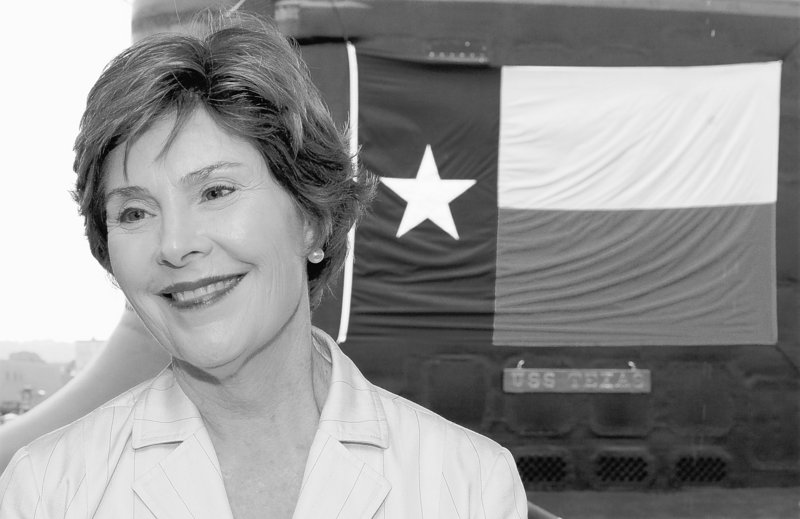One of the persistent questions about Laura Bush always has been whether she is more liberal than her husband.
In her new memoir, “Spoken from the Heart,” the former first lady refers to this line of inquiry as “an odd sort of Washington parlor game” that wearies her. So those answers will not be found in this book, which is scheduled to be released May 4. The Washington Post bought a copy Wednesday at a local bookstore.
Bush recounts the moment when CBS News anchor Katie Couric asked her if she believed the law permitting abortion should be overturned, and she expands her answer from then only slightly:
“We are a nation of different generations and beliefs, seeing issues through different eras and different eyes. While cherishing life, I have always believed that abortion is a private decision, and there, no one can walk in anyone else’s shoes,” she writes.
On gay marriage, she writes that before the beginning of the 2004 presidential campaign, “I had talked to George about not making gay marriage a significant issue. We have, I reminded him, a number of close friends who are gay or whose children are gay. But at that moment I could never have imagined what path this issue would take and where it would lead.”
It led, of course, to a divisiveness that persists in American politics still. In her memoir, Bush does not dwell on that. Instead, she writes with dismay of Sen. John Kerry, D-Mass., answering a presidential debate question about the subject by mentioning that Vice President Cheney’s daughter, Mary, is a lesbian. “Beside me, Jenna and Barbara gasped. They were utterly stunned that a candidate would use an opponent’s child in a debate,” she said.
She’s none too happy with Senate Majority Leader Harry Reid, D-Nev., and House Speaker Nancy Pelosi, D-Calif., for the mean things they said about her husband, President George W. Bush. She calls out the House leader for calling Bush “dangerous” and the Senate majority leader for calling him “a loser” and “a liar.”
“Subsequently, in a private, one-on-one meeting in the White House Cabinet Room, Reid said to George that he would stop calling him names. But he didn’t stop,” she writes.
There is some startling stuff in the book. The memoir, written with Lyric Winik, who is married to historian Jay Winik, passes the first-sentence test beautifully: “What I remember is the glass.”
It is the glass of a hospital nursery window. Little Laura Welch is 2½ years old, and her newborn brother is lying on the other side. He would live but a few days, spoken of as “a late miscarriage,” even though he was one with a birth certificate.
In this first chapter, Bush lays out the isolation of pain not spoken. “In those times, in West Texas, in the 1950s, we did not talk about those things,” she writes.
And there are some pointed choices and some unflinching honesty.
Her guilt for flying through a stop sign at the wheel of her father’s car and killing one of her close high school friends persists, she writes of the car crash when she was 17.
“And the guilt isn’t simply from Mike dying. There are the hard, inner circles wrapping around Mike’s parents and Mike’s sister, whose lives were changed and ruined.” There is guilt for having never paid a call to the parents. She “lost her faith that November, lost it for many, many years,” she writes, and she doesn’t refer to getting in back.
She has empathetic words for Hillary Rodham Clinton, whom her mother-in-law, Barbara Bush, once tartly described as “a word that rhymes with witch.” Their kinship was immediate, Bush writes, when they met in late December 1999.
Here is a rare instance in which she reveals herself taking direct action:
When Dick Cheney accidentally shot a hunting partner during a quail-shooting expedition in Texas, it was several hours before the White House put out a statement or briefed reporters on the incident. Laura Bush, who was returning from Italy, asked her chief of staff to call White House Chief of Staff Andy Card in the middle of the night.
“I wanted to urge the vice president’s office to state the facts, to be open, and to answer all questions. There was no need to say anything but the truth. Silence, which was all that was coming from the West Wing, was worse.”
In 438 pages, there are three brief mentions of Barack Obama.
And there are only two sentences raising the curtain on the 44th presidency:
“As in so many years past, Inauguration Day 2009 was cold. It was also historic, as the nation swore in its first African-American president.”
Send questions/comments to the editors.



Success. Please wait for the page to reload. If the page does not reload within 5 seconds, please refresh the page.
Enter your email and password to access comments.
Hi, to comment on stories you must . This profile is in addition to your subscription and website login.
Already have a commenting profile? .
Invalid username/password.
Please check your email to confirm and complete your registration.
Only subscribers are eligible to post comments. Please subscribe or login first for digital access. Here’s why.
Use the form below to reset your password. When you've submitted your account email, we will send an email with a reset code.